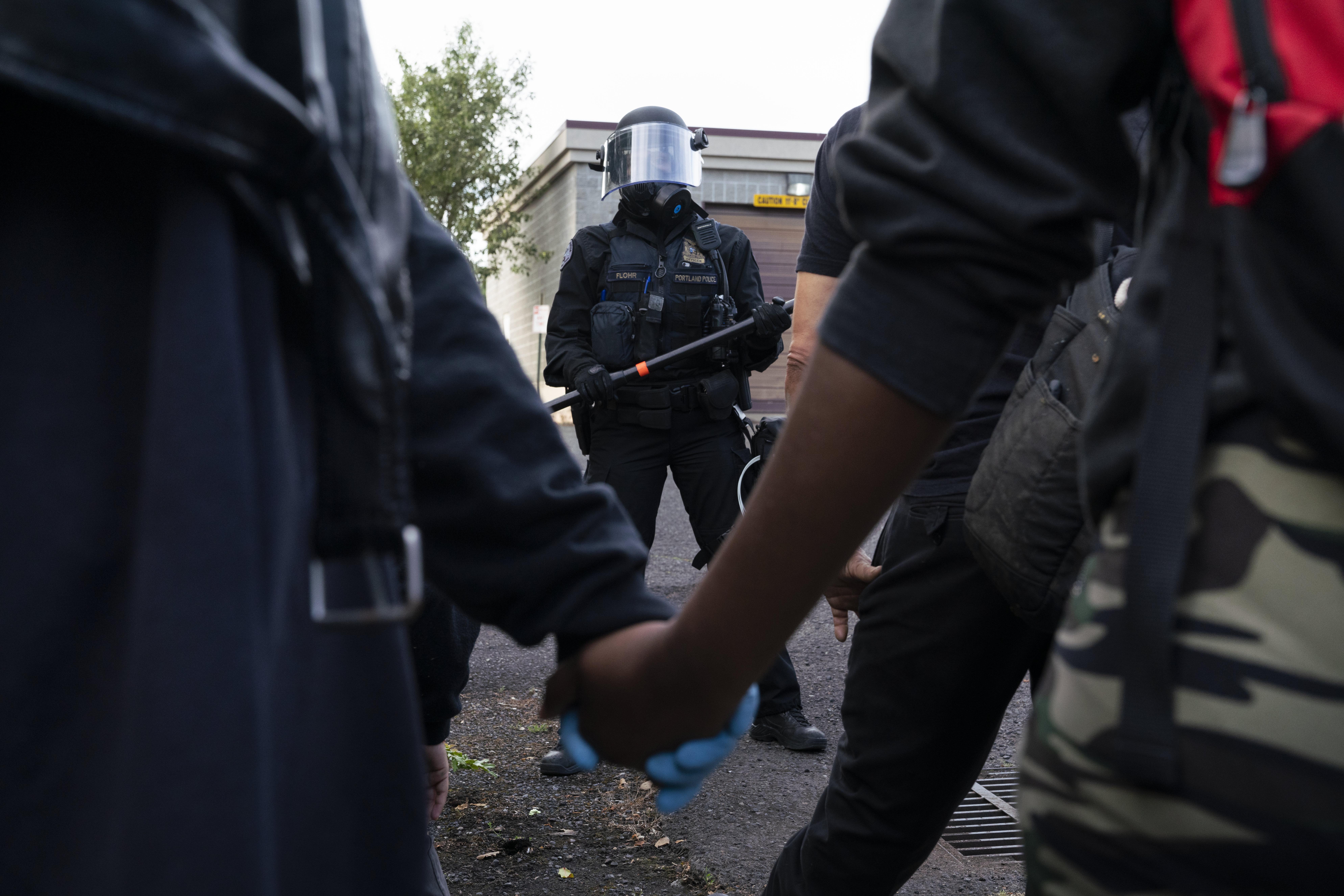
Thousands of people took to the streets in largely peaceful protests on May 31, 2020. The protests ultimately ended with police using tear gas and rubber bullets to disperse the crowd gathered around the Justice Center in downtown Portland.
Jonathan Levinson / OPB
Six months after a bill designed to reduce police use of force against protesters went into effect, a group of lobbyists and the City of Portland are pushing the state to make some big changes.
House Bill 2928, which was signed into law in July, prohibits the use of tear gas for crowd control unless the situation meets the definition of a riot. It also restricts the use of impact munitions for crowd control unless deadly force is authorized. Any “intentional violation” of the law constitutes second-degree official misconduct.
The legislation was written in response to the months of widespread protest which gripped Portland in 2020. Those protests frequently ended with police using impact munitions and tear gas, sometimes against crowds of thousands of people who were not engaging in property destruction or violence.
“My standard has been, is it constitutional? Is it right? Does it protect the people? Does it balance constitutional protections with keeping the peace?” state Rep. Janelle Bynum, a Clackamas Democrat who sponsored the bill, said in an interview.

Rep. Janelle Bynum, D-Clackamas, attends an Oregon House session on Monday, April 29, 2019, in Salem.
Laurie Isola / OPB
Portland city officials have said on multiple occasions that the law prevents police from intervening in violent or destructive demonstrations, an extreme interpretation of the law, according to some lawmakers. In response, the Oregon Department of Justice has issued two memos interpreting the legislation.
Oregon State Police requested the Justice Department analysis, which appears to address Portland city officials’ concerns.
The Portland police and the mayor’s office did not respond to requests for comment on the DOJ memos.
The two memos, one written in October and the other on Wednesday, address 20 different questions from Oregon State Police and clarifies what “crowd control” means in HB 2928.
“‘Control’ of a crowd can include such things as preventing the crowd from entering a particular location or building, maneuvering a crowd to a desired location, keeping a street or roadway open or closed, or preventing two or more types of crowds from interacting with each other,” the memo states. “‘Crowd control’ therefore appears to encompass more than just dispersing a crowd.”
Herbert Lovejoy, the assistant attorney in charge of the Oregon Department of Justice’s Government Services Section, wrote the memos. He said even in the case of a riot, tear gas can only be used against the people “engaged in the riotous behavior and not a crowd at large.”
Among Lovejoy’s other findings, he wrote that less-lethal munitions, such as 40mm foam rounds, can only be used in situations where deadly force is authorized or to address immediate threats to officer safety, so long as the officer doesn’t target a person’s head. The munitions can still be used against people if it is necessary to make an arrest.
Oregon State Police also sought clarity on a section of the law requiring law enforcement to take injured people to safety or allow them to seek help, and prohibitions against officers preventing emergency medical services from reaching injured people. The Department of Justice interpreted that section to apply to all people providing medical assistance. Police did not differentiate between protesters and volunteer protest medics during 2020 protests, but the DOJ memo appears to extend HB 2928′s protections to those volunteers.
In response to questions asking if law enforcement can legally use smoke to conceal their movement or break contact from a crowd, the Justice Department said, ‘yes.’ Smoke may technically be a toxic chemical, Lovejoy wrote, but using it for those purposes does not violate the new law.
Liability concerns
In Portland, city officials negotiating with a federal Justice Department increasingly agitated over how the city handled the 2020 protests have been quietly fretting over the law’s legal implications since its passage last summer.

Proud Boys beat a counterprotester and destroy the vehicle he was in after the group's "Summer of Love" rally in Northeast Portland's Parkrose neighborhood was met with anti-fascist counterprotesters on Aug. 22, 2021 in Portland, Oregon. The two groups engaged in a violent brawl for about an hour throughout the neighborhood.
Jonathan Levinson / OPB
Portland police remained out of sight during an hours-long violent clash on Aug. 22 between Proud Boys — a violent, far-right extremist group — and anti-fascists in Parkrose. Facing criticism over that decision, officials in the mayor’s office cited HB 2928 as the reason for not intervening. Then in October, Portland Police Lt. Jake Jensen told a Pearl District Neighborhood Association meeting that the restrictions in HB 2928 meant officers couldn’t safely intervene as anarchists smashed windows downtown.
“That’s the way our legislature has said we need to operate in a crowd control environment,” KOIN reported Jensen said. “So that’s the way we are going to operate in a crowd control environment.”
Bynum said the Portland City Attorney’s primary focus in the suggested changes is a liability.
“It tells me you’re not protecting civil rights,” she said. “You’re simply protecting risk.”
The Portland City Attorney, Oregon Association Chiefs of Police and the League of Oregon Cities are asking the state Legislature to amend HB 2928 to, among other things, permit officers to use impact munitions for crowd control in circumstances where physical force would be permitted. The current law forbids the weapons’ use in crowd control except to address immediate officer safety or when deadly force is authorized.
The city attorney’s proposed changes would also allow law enforcement to prevent protest medics from treating people injured by impact munitions, tear gas or sound devices.
In an annotated draft of the city’s proposed changes provided to OPB, the ACLU and Oregon Justice Resource Center expressed misgivings.
Alongside a proposal that would permit officers to use impact munitions on crowds in circumstances where officers deemed force necessary, the ACLU pointed out “use of force against people not engaged in conduct justifying the use of force is plainly unconstitutional.”
The organization said it would support the change if the wording specified the munitions could be used solely against a person engaged in conduct that would warrant that level of physical force.
Whereas the city appears to want to re-craft HB 2928 as a limited ban on crowd control weapons in specific circumstances, the ACLU said the law “should be crafted largely as a ban with limited exceptions.”
Bynum said if the city is able to identify flaws she and her fellow lawmakers can support fixing, she will be happy to move those changes forward.
“What I’ve done is make the space for the city to make its case and for the individual counties and cities to say that there’s a real flaw and that they need help. Whether they come up with the right request and legislation proposal, that’s up to them,” Bynum said.



